
















The Cape Chamber of Commerce and Industry is working with members to promote growth and build a smarter economy.
The Cape Chamber of Commerce and Industry, Africa’s oldest member-based business chamber, was established in 1804, firmly cementing our place as a catalyst for economic growth for over two centuries. We pride ourselves on being an instrumental player in establishing our region as one of sub-Saharan Africa’s major centres of trade, industry and innovation – a legacy that continues to this day.
As a dynamic organisation in a fast-changing world, our focus is on remaining relevant to the current challenges affecting business. Our key mandate is to improve the overall business environment, promoting growth and sustainability, and supporting our members’ interests. Our strategic interventions include lobbying key government departments and institutions, creating public-private dialogue through task teams and spearheading discussion forums to address system blockages. Through dialogue we strive to facilitate consensus around critical issues, and through targeted action we effect meaningful change. Strengthening public-private dialogue in turn strengthens business competitiveness and steers us towards a smarter network economy. We mobilise all economic stakeholders –private sector, business organisations, local government and national government – to collectively address sector-specific, industryidentified constraints and bottlenecks. This entails setting up task teams to identify needs
and effect legislative and regulatory change on key issues, a process galvanised by the post-pandemic economic milieu. Encouraging businesses to join hands with us and strengthen the dialogue through collective action makes all stakeholders more globally competitive.
In line with our collaborative approach, and as part of our service offering, we provide a digital platform where members interact and share skills and services. Our website forums and data portals function as a much-needed digital library and notice board aimed at keeping our members informed. Skills development, enterprise development, knowledge-sharing and partnership through topical webinars, seminars, workshops and business networking events form part of our offerings.
The Chamber’s professional team assists with a wide range of business enquiries, from local issues to international trade and investment. Our advice and information is current, timeous and relevant. Information is sourced on a continuous basis from a broad network of local and international partners. Our International Trade desk is the first point of contact for international business and we arrange opportunities for collaboration and networking, giving our members visibility and access to global markets. Together we can actively shape our future success.
capechamber.co.za
Image: Shawn Harrison on Unsplash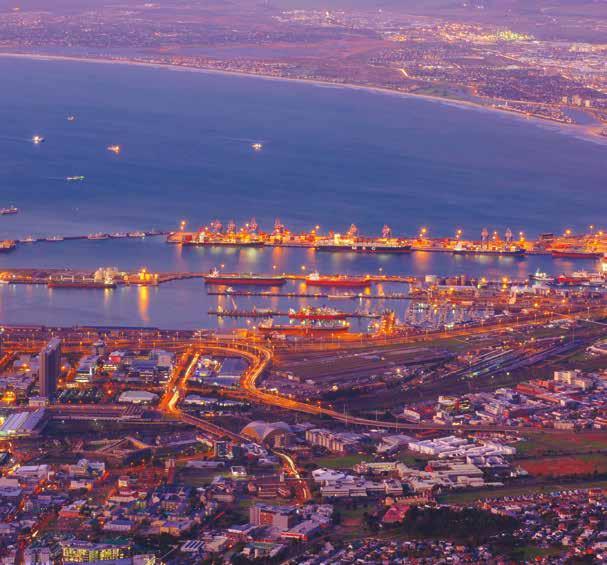

We are immensely proud of our 218 year history as the voice of organised business in the Western Cape. The Cape Chamber of Commerce and Industry continues to have relevance to the needs of business today - with a finger on the pulse and our eyes firmly to the future, we are a driving force of change and progress towards sustainable economic development.

We facilitate connection in exports, targeted imports and investments, unlocking new opportunities for our members, locally and internationally. Through our vast network of dynamic partnerships, we give our members, both large and small, visibility and traction.
We have a targeted focus on:
• enterprise development and capacity building
• clustering and sectoral development
• precinct development and geographic spread
• competitiveness and value chains
• advocacy to advance the needs of our members
In achieving our aim of growing the Western Cape economy sustainably, we know that creating an enabling environment for business to thrive is the key to economic prosperity.

We have initiated partnerships with like-minded organisations, spearheaded public-private dialogue processes, and identified pain points in the enabling environment. We are mobilising all stakeholders on behalf of our members to steer the Western Cape towards a smarter network economy.
Join us to shape a better future.








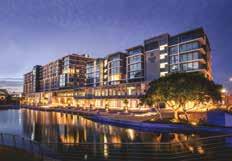
guide to business and investment.
and the film sector are bouncing back and oil and gas exploration on and off the West Coast is taking off. Where South Africa faces its toughest challenges in energy, transport and housing the Western Cape is stepping up with practical solutions.



Publishing director:
Chris Whales
Editor: John Young
Managing director: Clive During
Online editor: Christoff Scholtz
Designer: Tyra Martin
Production: Sharon Angus-Leppan
Ad sales:
Gavin van der Merwe
Sam Oliver
Shiko Diala
Gabriel Venter
Venesia Fowler
Tennyson Naidoo
Graeme February
Administration & accounts:
Charlene Steynberg
Kathy Wootton
Distribution and circulation
manager: Edward MacDonald
Printing: FA Print
The 2024 edition of Western Cape Business is the 17th issue of this highly successful publication that, since its launch in 2005, has established itself as the premier business and investment guide for the Western Cape.
The Western Cape has several investment and business opportunities. In addition to the regular articles providing insight into each of the key economic sectors of the province, a special feature focuses on the meetings, incentives, conferences and exhibitions (MICE) sector in the Western Cape. The Cape Town International Convention Centre celebrated its 20th year of operation in 2023 and is now a complex comprising two large and adaptable facilities. Jointly owned by SunWest International, the City of Cape Town and the Provincial Government of the Western Cape, the venue has become a popular destination for all-Africa conferences such as the Investing in African Mining Indaba, which in 2023 attracted nearly 10 000 delegates from more than 100 countries. The two public entities jointly hold 94.9% of the shareholding of the company that runs the CTICC. Many other towns in the Western Cape such as Stellenbosch have conference facilities, whether they are in dedicated facilities or attached to hotels or resorts.
To complement the extensive local, national and international distribution of the print edition, the ebook edition can also be viewed online at www. westerncapebusiness.co.za. Updated information on the Western Cape is also available through our monthly e-newsletter, which you can subscribe to online at www.gan.co.za, in addition to our complementary business-to-business titles that cover all nine provinces as well as our flagship South African Business title and the new addition to our list of publications, The Journal of African Business, which was launched in 2020. ■
Chris Whales Publisher, Global Africa Network Media | Email: chris@gan.co.zaWestern Cape Business is distributed internationally on outgoing and incoming trade missions, through trade and investment agencies; to foreign offices in South Africa’s main trading partners around the world; at top national and international events; through the offices of foreign representatives in South Africa; as well as nationally and regionally via chambers of commerce, tourism offices, airport lounges, provincial government departments, municipalities and companies.
Member of the Audit Bureau of Circulations
COPYRIGHT | Western Cape Business is an independent publication published by Global Africa Network Media (Pty) Ltd. Full copyright to the publication vests with Global Africa Network Media (Pty) Ltd. No part of the publication may be reproduced in any form without the written permission of Global Africa Network Media (Pty) Ltd.
PHOTO CREDITS | Airspace-africa.com; Boogertman + Partners; Cape Town International Convention Centre (CTICC); Craft Design Institute (CDI); DCI Community Housing Services; Design Lab; Eskom; FutureEd; HORTGRO; Kropz; PASA; SAIAMC; SAOGA; Sky Pixels/Wikimedia Commons; TNPA; Vinpro; Ryan Warneke/CCID; Yacht Club; John Young.
PUBLISHED BY
Global Africa Network Media (Pty) Ltd
Company Registration No: 2004/004982/07
Directors: Clive During, Chris Whales
Physical address: 28 Main Road, Rondebosch 7700
Postal address: PO Box 292, Newlands 7701
Tel: +27 21 657 6200 | Fax: +27 21 674 6943
Email: info@gan.co.za |
Website: www.gan.co.za
ISSN 1816 370X
DISCLAIMER | While the publisher, Global Africa Network Media (Pty) Ltd, has used all reasonable efforts to ensure that the information contained in Western Cape Business is accurate and up-to-date, the publishers make no representations as to the accuracy, quality, timeliness, or completeness of the information. Global Africa Network will not accept responsibility for any loss or damage suffered as a result of the use of or any reliance placed on such information.
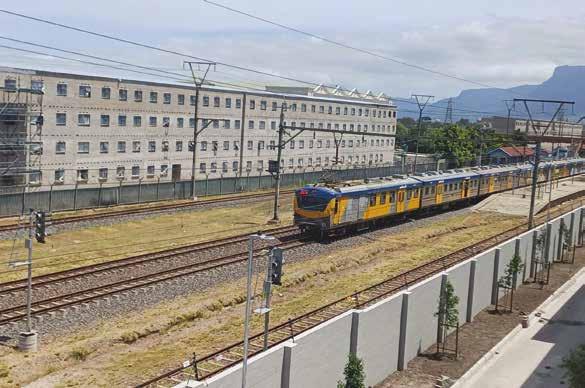
Tourism and the film sector are bouncing back and oil and gas exploration on and off the West Coast is taking off. Where South Africa faces its toughest challenges, in energy, transport and housing, the Western Cape is stepping up with practical solutions.
By John YoungIn film, tourism and oil and gas the numbers are increasing. More film shoots, more tourists and more drilling for oil and gas are all positives for the balance sheet of the Western Cape. But when it comes to energy, transport and housing, the Western Cape Provincial Government and its municipalities are having to make up for reduced supply: less electricity from the national grid, fewer trains running and not enough houses to make up for the continued movement of people to the province.
Rather than sitting back and lamenting the situation, the provincial and municipal authorities are laying out and executing detailed plans to deal with fixing these important economic drivers.
In providing affordable housing, for example, an innovation in land use is taking place in the Cape Town suburbs of Goodwood and Retreat. The rail reserve (unused land next to the line) has been leased from
the Passenger Rail Agency of South Africa (PRASA) by a Section21 non-profit organisation called DCI Community Housing Services. The Goodwood Station Social Housing Development project was officially opened in 2023 and the organisation has partnerships with the City of Cape Town and the provincial government’s Department of Human Settlements. DCI provides rental housing accommodation for people who do not qualify for the breaking-new-ground subsidy (previously RDP) and are unable to participate in the formal non-subsidised housing market.
The decline in passenger rail journeys in greater Cape Town has been marked in recent years. New rolling stock is being introduced and security is being promised, but the process is going slowly. The City of Cape Town’s 2022 feasibility study on taking over the management of passenger rail services from PRASA showed its intent. Persistent calls by the city’s mayor to
meet on the future of the rail network in the peninsula have not yielded any success as of January 2024, but increasing passenger rail journeys on a safe and reliable network remains a goal of the city.
The city wants to have a fully-integrated system, which would include rail. The Transport and Urban Development Authority (TDA), located within the municipality, is responsible for planning, costing, contracting, regulating, monitoring, evaluating, communicating, managing and maintaining the City of Cape Town’s transport infrastructure, systems, operations, facilities and network.
The provincial government has followed the city’s lead with the establishment of a Mobility Department with its own MEC which now monitors the province’s transport programmes such as financial support to bus and taxi services, the transport regulation mandate and extensive traffic management operations.
Cape Town Mayor Geordin Hill-Lewis says, “We are actively working towards ending loadshedding as aggressively as we can.” A R1.2-billion solar PV (photovoltaic) plant is being built near Somerset West, small-scale embedded generation is being encouraged and a Power Heroes programme will reward citizens for using less electricity.
At provincial level, a three-pronged strategy, the Energy Resilience Programme, aims to bring energy security to the province. Public spaces like schools will be fitted with solar panels and battery systems, several towns will be taken off the Eskom grid and finally, the Municipal Energy Resilience Plan is supporting councils in generating, procuring and selling power themselves.
The Film Permit Office of the City of Cape Town issued 3 900 film permits between July 2022 and July 2023. Most of these were for commercials but also included 499 TV series and more than 100 feature films. A freeze was placed by the city authorities on fees payable for traffic and metro police services for three years in a row in an attempt to stimulate this sector, a move that appears to have paid off.
Film location bookings rose to 8 300 in 2022/23, as opposed to 7 400 a year earlier. The Cape Town Central City Improvement District (CCID) reports that the city’s CBD supports 24 artistic studios, including film studios. The sector supports more than 35 000 jobs and contributes about R5-billion to the local economy.
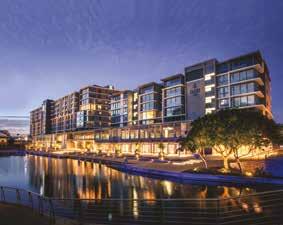
The Canal District at the V&A Waterfront is growing. The Yacht Club and AC Hotel by Marriott are adjacent tower blocks sited over office space, with the former offering private apartments. The aha Harbour Bridge Hotel & Suites is another property offering access to the Cape Town International Convention Centre.
A record 317 000 overseas visitors visited the Cape in December 2023. Cape Town International Airport’s 2023 number of international arrivals reached 2.8-million, topping the 2.6-million international passengers it welcomed in 2019. The Victoria & Alfred Waterfront recorded December retail sales of R1.2-billion, a 16% increase over 2022.
Plans for a new airport for greater Cape Town moved forward in 2023. The existing Fisantekraal Airfield north of Durbanville was rebranded the Cape Winelands Airport in 2020 by its new owners and there are plans for it be fully redeveloped with expanded facilities. This would not only help to relieve congestion at Cape Town International Airport in terms of cargo and tourism arrivals but would provide a much closer destination alternate for inbound flights which currently have to carry enough fuel to get their planes to George if there for some reason they are not able to land at CTIA.
An increasing number of oil and gas exploration permits have been granted both onshore and offshore along the West Coast. While this has disturbed conservationists, the results from surveys done in Block 5/6/7 suggest that the oil available in South African waters will at least match the significant resources that have been found in Namibian territory offshore.
In his 2022 State of the Province Address, Premier Alan Winde claimed that Cape Town is:
• Africa’s greentech hub
• Africa’s BPO capital
• Africa’s tech capital
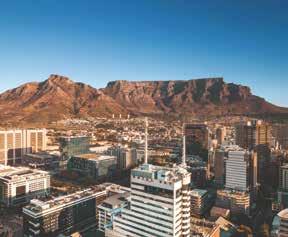
In addition, he quoted the Global Startup Ecosystem Report 2021, where Cape Town is listed as the number one performer in Africa for technology ecosystems and is home to almost two-thirds of all start-ups in South Africa.
There are 22 active incubators and accelerators in the region which provide networking and marketing opportunities and links to funders and markets. It is because the Western Cape has been investing in digital infrastructure that the Premier can persuasively make these claims.
The provincial government’s broadband roll-out project is in Phase 2. The Western Cape Department of Health was the first in the country to go digital, including 265 primary healthcare centres and 181 mobile posts.
Cape Town also, according to the Global Financial Centres Index (GFCI), ranked second in Africa in 2020 (behind Mauritius) in competitiveness as a financial centre. Neighbouring Stellenbosch is advancing its reputation for technological innovation and the output of the region’s four universities and six TVET colleges ensures that the tech sector has the necessary human capital.
Cape Town’s share of national employment in the financial sector is about 20% and the contribution to gross value-added (GVA) is 15%.
Finance, business services and real estate combined contribute 28% to the gross domestic product (GDP) of the Western Cape. The financial services and insurance sector are key components of the economy.
Although agriculture accounts for just 4.3% of GDP on its own, the sector is responsible for the fruit and vegetables that contribute to agro-processing which accounts for nearly 40% of the province’s export basket. (Agro-processing accounts for 8.1% of GDP.) Citrus, wine, apples and pears, grapes, fruit juice, fruit and nuts and tobacco all appear in the top 10 of the province’s exports.
Seventy percent of South Africa’s beverage exports come from the Western Cape. Grapes and wine sales to Europe remain strong, but the Chinese market is becoming increasingly important.
The province has a diverse manufacturing sector ranging from textiles, clothing, footwear, boatbuilding and furniture to coke and refined petroleum products. Excluding agro-processing, other manufacturing makes up 6.9% of GDP.
The province has a dedicated investment agency, Wesgro, which also works to promote the region’s tourism. The Investment Promotion Unit of Wesgro is working with various regions within the Western Cape to attract investment and accelerate exports.
In recent years, the biggest investments have been in renewable energy and manufacturing. Between 2003 and 2021, the Western Cape attracted $1.93-billion in renewable energy projects.
Other important sectors are agro-processing, aviation, business services, education and training, financial services, real estate, ICT, light manufacturing, oil and gas, timber, tourism, waste beneficiation and clean energy.
Another vehicle for attracting investment are Special Economic Zones (SEZ) and Industrial Development Zones (IDZ). Zones at Atlantis and Saldanha aim to tap into growing markets – maritime, oil and gas and renewable technologies.
The Atlantis Special Economic Zone (ASEZ) is attracting investors in the greentech market. An early investor in the zone was GRI Towers South Africa, a wind turbine tower manufacturer. ■









If you are looking for an industry leader who understands the sector, then partner with a bank that sees the bigger picture. We have designed a bespoke offering that will support your manufacturing business needs, and our dedicated team has the knowledge and expertise to help your business grow.


Think bigger.
Think Nedbank Commercial Banking.



For more information about our bespoke offering, scan the QR code or e-mail us at manufacturing@nedbank.co.za.

So, why not partner with Nedbank Manufacturing?













In providing an overview of the Western Cape’s new Growth for Jobs Strategy, Minister for Finance and Economic Opportunities, Mireille Wenger, challenges businesses and citizens of the province to have the courage to adapt, reform and make the right choices.

If you are reading this now, I would like you to close your eyes and picture where you will be in 2035.
What state will our country and province be in? What will be happening in our economy? Will we have enough jobs for future generations? Will there be hope? I am sure this exercise will cause you some anxiety, given the challenging times we face today…
Now imagine a 2035 where our economy is growing at between 4% and 6%. Where we are creating hundreds of thousands of new jobs, lifting people out of poverty. Where businesses, big, small and informal have the energy, water, infrastructure, skills and technology to grow and succeed. Where a child, no matter where they are born, has the pathway to a better life.
I am sure what you are now feeling is hope. The sort of contagious hope that cannot be contained.
This is the future we want for the Western Cape and for South Africa. This is the better future we want to build.
During this time of difficulty for our country, with stagnant growth, devastating loadshedding, the real prospect of recession and high levels of unemployment and despair, the question can be fairly asked: is it realistic for the Western Cape to be setting out so audaciously to achieve 4% to 6% of break-out economic growth?
The real question, I believe, is rather why South Africa is not already achieving this growth? We have everything we need to succeed as a country if we just get the fundamentals of growth right. What is clear to me is that we will never achieve it if we are limited in our ambition, constrained by the wrong policies and lack the courage to adapt, reform and make the right choices.
Vision
Change requires a vision and action towards it – so, yes, we can realise a better future for our country, and we must work toward it with determination.
The Growth for Jobs Strategy is the Western Cape’s bold step towards realising this better future. We know what the Western Cape and South Africa are capable of if we enable the private sector’s success.
And so, this Strategy provides a courageous vision for our province, with clear targets for
each key focus area that our economy needs to succeed. To be clear, this is not just a vision for our government. The targets are not ours alone. They are yours too: business, big and small, civil society, entrepreneurs and every citizen in our province. This is what we can achieve if we work together and make the right choices, now, today.
Like the rest of South Africa, the Western Cape faces a range of deep, interconnected, socio-economic challenges that include unemployment, poverty and crime. While there is no panacea for these challenges, which have deep roots in the country’s history and social structure, there is also no prospect of addressing any of them without faster economic growth.
Economic growth is essential to generating rapid and sustained job creation, faster growth in living standards and increased resources available to society.
The Western Cape Government identified the need for a strategy to lift dramatically the provincial growth rate and, to the extent that growth continues to falter in South Africa, to decouple the province’s growth trajectory from that of the rest of the country.
Therefore, this Growth for Jobs Strategy sets out a comprehensive, challenging and ambitious goal for the Western Cape to grow its economy by between 4% and 6% by 2035.
It is also a strategy that clarifies that how we grow our economy is as important as the growth itself. In this way, the Growth for Jobs Strategy distinguishes itself from previous strategies, by providing a long-term perspective with clear targets, framed within defined principles. It is centred on systemic solutions that address key binding constraints and an enabling environment for the private sector that accelerates our economic growth.
The formulation of the Growth for Jobs Strategy has been data-driven, evidence-led and has involved extensive consultation across government, with stakeholders from the private and public sectors, and representatives from across civil society and academia.
At its heart, the Growth for Jobs Strategy is premised on a recognition that the private sector creates jobs, while the State needs to create an environment in which people and businesses are enabled to create and exploit opportunities as they arise. This kind of horizontal enablement empowers
I am reminded of President Nelson Mandela’s wise words, which continue to hold so much truth today: “It seems impossible until it is done.”
Let’s get it done, so that a prosperous Western Cape is not something in our imagination, but a new, real era of hope, opportunity and freedom. ■

citizens and fosters independence, freedom and self-reliance.
To give effect to this approach, the Growth for Jobs Strategy has several important anchors:
• Clear principles set out in a strategic framework that have guided thinking and decisions.
• Crucial priority focus areas (PFAs), namely driving growth through investment, stimulating market growth through exports and growing domestic markets, enhancing energy resilience and driving the transition to net zero carbon, driving water security and resilience, technology and innovation, infrastructure and the connected economy, improving access to economic opportunities and employability. These PFAs shape decisions around the nature of the interventions needed to maximise impact.
Finally, the Growth for Jobs Strategy is a whole-of-government, all-of-society st rategy whose success requires the energy, commitment and allocation of resources from across government, the private sector and civil society.
The Growth for Jobs Strategy is the Western Cape’s bold step towards realising this better future. Be a part of our journey!
The Western Cape is cementing its place in the top rank of business tourism destinations.
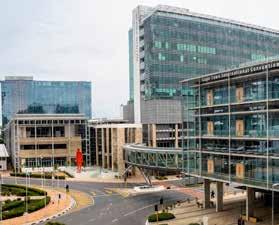
Many parts of the Western Cape, and the city of Cape Town in particular, have the ideal combination of conference and exhibition infrastructure, adequate accommodation and unique settings to succeed in the meetings, incentives, Convention and exhibitions (MICE) sector.
The 30th edition of the Investing in African Mining Indaba in February 2024 showcased the ability of the Cape Town International Convention Centre (CTICC) to host large events. With about 10 000 delegates from more than 100 countries, hundreds of stands and a cornucopia of talks, events and presentations, the conference was a logistical marvel with the Hyve Group seemingly handling the increased numbers with ease.
The CTICC itself celebrated its 20th anniversary in 2023 with a near doubling of revenue over the previous year.
At the other end of the scale, wine farms such as Steenberg offer intimate meeting rooms in a pretty setting. With its own golf course, Steenberg
nicely illustrates the concept of Bleisure, the idea of combining business with leisure.
Business tourists routinely spend at least twice as much money during the course of their trips as regular tourists, so the market is an attractive one. The Cape Town and Western Cape Convention Bureau, a division of Wesgro, is devoted to attracting conferences and events to the province. Wesgro is the tourism, trade and investment promotion agency for Cape Town and the Western Cape.
Cape Town has routinely been ranked as the top African city in terms of hosting international association meetings. The subject matter of these conferences has tended to be centred on the medical sciences, technology, economics and education.
The 46th riding of the Cape Town Cycle Tour in 2024 expected to attract about 35 000 cyclists, confirming the event’s reputation as the biggest timed bike race in the world.

The Knysna Oyster Fest, which was held in the Southern Cape town for the 40th time in 2023, attracts huge numbers of cyclists, marathon runners and oyster eaters every year.
The Cape Town International Jazz Festival became a mega-event over time, earning a solid reputation for musical excellence and excellent attendances. Suspended during the Covid epidemic, it was due to return to the events calendar in 2024 but details are still to be confirmed.
South Africa Sevens is an annual rugby sevens tournament that has become a popular part of the roster of events held at the Cape Town Stadium. The tournament is part of the HSBC World Rugby Sevens Series run by World Rugby.
The country’s premier Afrikaans language festival, the Klein Karoo Nasionale Kunstefees (KKNK), presents more than 1 000 visual and performing artists in more than 200 productions and exhibitions over eight days in Oudtshoorn.
When the capacity of the Cape Town International Convention Centre was doubled in 2017, there were some who wondered how the additional space would ever be used. Instead, the eastern extension, now known as CTICC-2, has been working just as hard as the original space that started operating in 2003.
The Cape Town International Convention Centre Company (Convenco), the holding company of the CTICC, was formed in 1999 by the City of Cape Town, the provincial government of the Western Cape and the business sector. Shareholding in Convenco, which owns and manages the business of the CTICC, is made up as follows: City of Cape Town (72.7%), the Provincial Government of the Western Cape (22.2%) and SunWest International (Pty) Ltd (5.1%).
In the 2023 financial year, the CTICC hosted 427 events, up from 225 in the previous year, and nearly doubled revenue to R278-million. This returned the
company to profit after the tough years brought on by Covid-19. In addition to a significant contribution of R5.4-billion to the Western Cape’s gross geographic product (GGP), the centre sustained or created nearly 11 000 jobs nationally.
Some 275 000 people attended events at the venue in the financial year, including more than 25 000 who came looking for design ideas at Decorex Cape Town and 12 000 techies who tuned in to the Africa Tech Festival.
The CTICC was also the proud winner of the 2023 Clean Audit Award, Municipal Finance Management Act.
Among the big international conferences to be held at the CTICC in 2024 are the FIP World Conference of Pharmacy and Pharmaceutical Sciences and the Meeting of the International Society of Pneumonia and Pneumococcal Diseases (ISPPD-13). WTM Africa, “Africa Travel Week ”, will be at the CTICC in April 2024 and the 25th hosting of FIGO World Congress of Gynecology and Obstetrics will come to Cape Town in 2025.
• Number one city in Africa for business events, International Congress and Convention Association, 2010 - 2022
• World’s Leading Festival and Events Destination, World Travel Awards 2018
• Best Destination in Africa, World Tourism Awards 2019
Source: Wesgro
CTICC: 20 years in numbers
• 9 000 events
• 700+ international events
• 9.5-million visitors
• R60-billion cumulative contribution to national GDP
• R51.5-billion cumulative contribution to Western Cape GGP
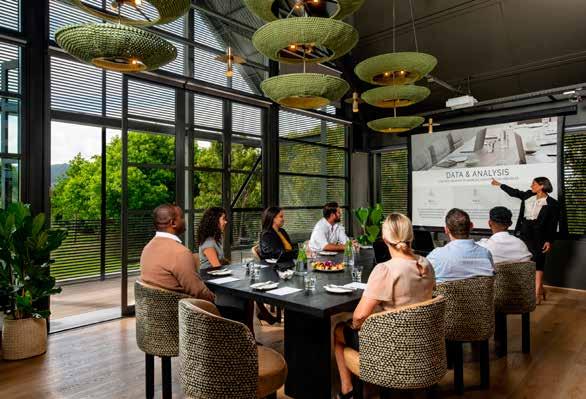
A short walk separates the Castle of Good Hope and the Zeitz Museum of Contemporary Art Africa (Zeitz MOCAA) in central Cape Town but the ambience of the two venues could not be more different. Both are available for hire for conferences, performances and exhibitions.
The Castle oozes history and has no fewer than three museums within it walls, the Military Museum, the William Fehr Collection of paintings and decorative arts and a permanent ceramic exhibition, FIRED. The grassed quadrangle lends itself to events and cocktail parties.
Zeitz MOCAA is the epitome of modernity and it promises an “otherworldly venue hire experience”. This promise is based on the repurposed buildings’ “understated eccentric interior design and artwork that embody what modern Africa has to offer”. The atrium offers exceptional acoustics while the elegant Scheryn Collection Arena lends itself to panel discussions and conferences
A few minutes away from the CBD along
the N1 highway, the Century City Conference Centre (CCCC) can accommodate 1 900 delegates across 20 different venues, 11 meeting rooms and four halls. There are 540 hotel rooms within walking distance.
Visit Stellenbosch lists 34 conference venues on its website, ranging (in the theatre configuration) from the 600-seat Cavalli Estate to the Rupert Museum, which has room for 30 delegates. Almost all of the area’s wine farms and hotels are equipped to host conferences and Stellenbosch University has a large range of venues.
George’s position at the heart of the Garden Route makes it a popular conference destination. The fact that the town has no fewer than five golf courses within the city limits and several more nearby adds to its appeal.
The Fancourt complex has several venues and the Protea Hotel King George regularly attracts repeat customers. The Oubaai Hotel, Golf & Spa on the coast at Herolds Bay has few competitors when it comes to dramatic settings. ■
Steenberg offers intimate settings and luxury surroundings.

01.
HOT EMERGING MARKET
Growing middle class, affluent consumer base, excellent returns on investment.
02.
LARGEST PRESENCE OF MULTINATIONALS ON THE AFRICAN CONTINENT
SA is the location of choice of multinationals in Africa. Global corporates reap the benefits of doing business in SA, which has a supportive and growing ecosystem as a hub for innovation, technology and fintech.
03.
FAVOURABLE ACCESS TO GLOBAL MARKETS
05.
The African Continental Free Trade Area will boost intra-African trade and create a market of over one billion people and a combined gross domestic product (GDP) of USD2.2-trillion that will unlock industrial development. SA has several trade agreements in place as an export platform into global markets.
ADVANCED FINANCIAL SERVICES & BANKING SECTOR
SA has a sophisticated banking sector with a major footprint in Africa. It is the continent’s financial hub, with the JSE being Africa’s largest stock exchange by market capitalisation.
07.
YOUNG, EAGER LABOUR FORCE
SA has a number of world-class universities and colleges producing a skilled, talented and capable workforce. It boasts a diversified skills set, emerging talent, a large pool of prospective workers and government support for training and skills development.
09.
MOST DIVERSIFIED ECONOMY IN AFRICA
South Africa (SA) has the most industrialised economy in Africa. It is the region’s principal manufacturing hub and a leading services destination.
04.
PROGRESSIVE CONSTITUTION & INDEPENDENT JUDICIARY
SA has a progressive Constitution and an independent judiciary. The country has a mature and accessible legal system, providing certainty and respect for the rule of law. It is ranked number one in Africa for the protection of investments and minority investors.
06.
ABUNDANT NATURAL RESOURCES
SA is endowed with an abundance of natural resources. It is the leading producer of platinum-group metals (PGMs) globally. Numerous listed mining companies operate in SA, which also has world-renowned underground mining expertise.
08.
WORLD-CLASS INFRASTRUCTURE AND LOGISTICS
A massive governmental investment programme in infrastructure development has been under way for several years. SA has the largest air, ports and logistics networks in Africa, and is ranked number one in Africa in the World Bank’s Logistics Performance Index.
10.
EXCELLENT QUALITY OF LIFE
SA offers a favourable cost of living, with a diversified cultural, cuisine and sports offering all year round and a world-renowned hospitality sector.


• Uncapped data
• 20GB streaming data
• Unlimited Closed-User Group Minutes (Telkom-to-Telkom calls including Telkom landline)
• 200 Other-Network Minutes
• Unlimited SMSs
• SIM-only R350
• Mobile service with mobile device
• Uncapped data
• 20GB streaming data
• Unlimited Closed-User Group Minutes (Telkom-to-Telkom calls including Telkom landline)
• 600 Other-Network Minutes
• Unlimited SMSs
• SIM-only R500
• Mobile service with mobile device
Book an appointment for the full presentation. Email us at RT15enquiries@telkom.co.za
Uncapped data with no FUP applied to the package. Data access will never be terminated or stopped. Includes WhatsApp.
Telkom Naledi packages come with a dedicated streaming bundle for YouTube, Facebook, Facebook Messenger, Twitter, Instagram, LinkedIn and WhatsApp.
Network-based CUG. Telkom is the only company that offers this converged voice-call solution across fixed and mobile numbers, which will result in significant voice-calling savings.
State users on Top-Up options can top up their all-net minutes at the discounted State OOB rate of R0.45 (36% discount).
Full allocation of all package bundles and benefits even if a SIM is activated mid-month. No proration is applied – as we would do normally.
Event billing and premium-rated events can be blocked at a SIM level, backed by the setting of a zero spend limit.
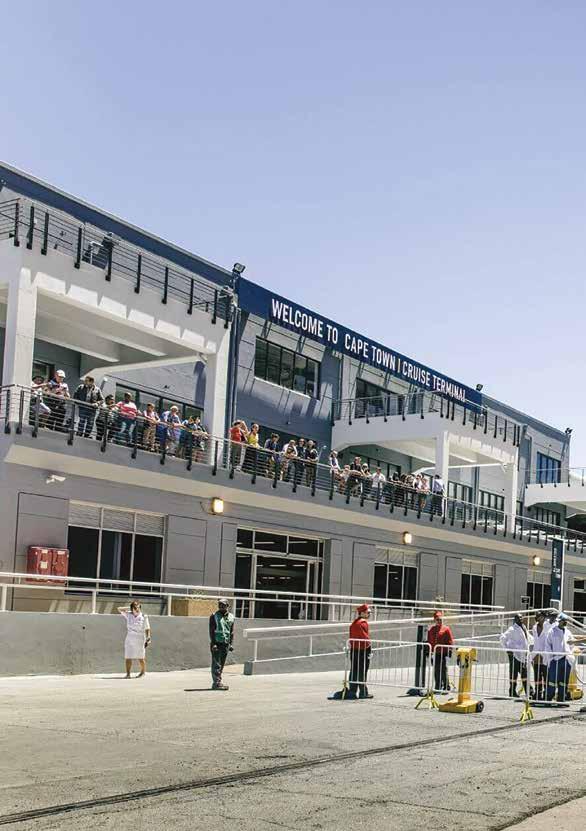
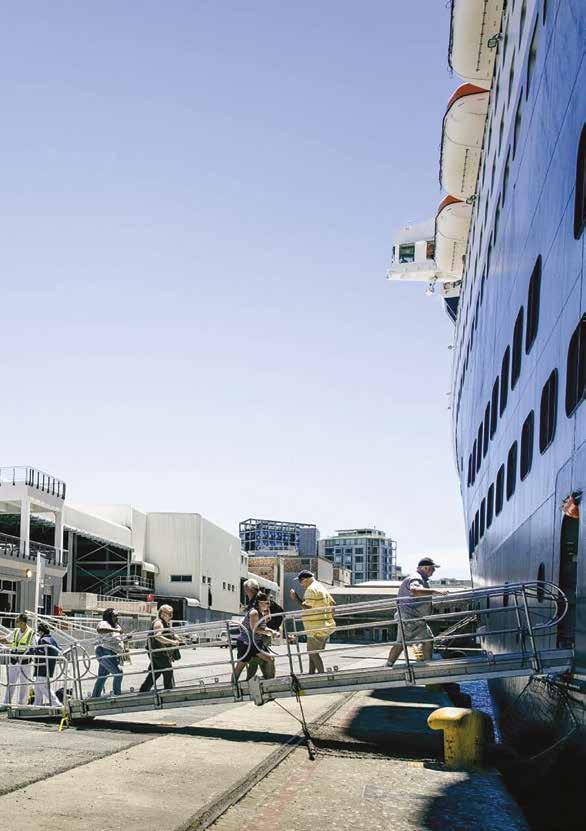
Port logistics are hampering exports.
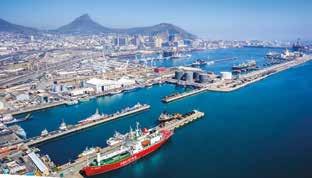
Despite producing record volumes of fruit, Western Cape farmers are not able to export their product as fast as they want to because of problems at the Port of Cape Town. With some cranes having to stop working in high winds and a shortage of gantries to load and unload containers, turnaround times reached such low levels that fruit-farming associations threatened legal action against port operator Transnet.
Wolfe Braude, manager of Agbiz’s Fruit Desk, told Business Day that the value of South Africa’s agricultural exports is higher than the country’s automotive exports and about double the value of iron ore, or iron and steel exports. National fruit exports are valued at about R72-billion and account for about 35% of total agriculture exports.
The Western Cape in 2020 exported agricultural goods worth about R54-billion, making it the sixth-largest global exporter of such products in Africa.
Berries are a growing subsector and two-thirds of production occurs in the Western Cape. More than 70% of the crop is exported and the major production companies are Berryworld South Africa, United Exports and Haygrove SA. Berries thrive between George and Swellendam and sales of chippers have grown because blueberries have to be vigorously pruned. There is plenty of scope for exports to grow. Current annual exports are 13 500t compared to over 200 000t for table grapes and about 300 000t for apples (South African Berry Producers’ Association).
Hortgro, a deciduous fruit industry association, said that export volumes for six fruits including peaches and apples were 35% down in November and December 2023 compared to the previous year. Hortgro was one of the organisations considering legal action to deal with the situation.
Citrus volumes reached a record 165-million cartons in 2023.
And yet citrus farmers packed a record number of cartons in 2023, 165-million.
Away from the possible legal battles that the export of fruit might present, Hortgo has launched a new testing facility for deciduous fruits on the Welgevallen experimental farm of Stellenbosch University. The new phytosanitary facility will help improve access to new markets for deciduous fruit growers and marketers.
Liquid kelp products is a growing subsector. Farmed kelp in Gansbaai is processed to create products that assist with root growth in crops. Afrikelp is a company that exports to more than 50 countries and claims that its products improve water and nutrient-use efficiency, together with equipping plants to better handle droughts.
The South African Rooibos Council announced in 2022 that it would start paying a levy on the product to trusts for Khoi and San people. A payment of R12.2-million was paid in July and the future levy would amount to 1.5% of the farm gate price.
This followed news that the long battle for protected status for rooibos in the EU finally reached an end. The
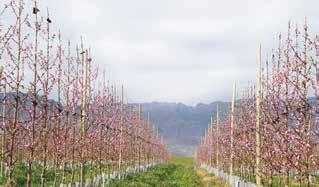
best-known products that are forever linked to their home regions are champagne and Port, and France and Portugal have fought hard for those rights. Now the Western Cape’s herbal tea product enjoys the same privileges, which is great news for the roughly 450 farmers working with rooibos (350 commercial plus 100 small-scale farmers). The sector produces about 20 000 tons of rooibos every year, about half of which is exported.
Agribusiness and agro-processing are vital parts of the provincial economy with about 45% of South Africa’s agricultural exports moving through the province. The value-add in the sector amounts to more than R14-billion per annum (Invest Cape Town).
Seven of the top 10 exports from the province are agricultural or agro-processed products. As Wesgro notes, the Western Cape is responsible for
• Almost half of South Africa’s agribusiness exports
• About 70% of South Africa’s beverages exports
• About 85% of South Africa’s fisheries exports
Exporters were introduced to some digital innovation in 2020 in the form of the Cape Export Network. CEN, a joint initiative of the Western Cape Provincial Government, Wesgro and Wines of South Africa (WoSA), is a platform that connects wine producers, buyers and importers.
Assessed independently from the country, the Western Cape is the world’s fifth-largest exporter of citrus fruits. Oranges are the province’s number one citrus e xport and soft citrus is growing. Europe remains the most important market but the Asia and Oceana markets are growing. The top five countries are the Netherlands, the UK, Russia, UAE and China.
Aquaculture Association of Southern Africa: www.aasa-aqua.co.za
Citrus Growers’ Association: www.cga.co.za
Fresh Produce Exporters Forum: www.fpef.co.za
South African Rooibos Council: www.sarooibos.co.za
Western Cape Department of Agriculture: www.elsenburg.com
In addition, the region exports 70% of all South African beverages and spirits and 96% of its wine. The region produces 11 different commodities. Fruit, poultry, eggs, winter grains, viticulture and vegetables comprise more than 75% of total output.
Tiger Brands announced in 2020 that it intended focussing on what it called “everyday branded food and beverages”. The result of that focus is that the company’s food-canning business is to be put up for sale.
Fears were raised in the town of Ashton that up to 4 000 jobs would be lost and 300 farmers in the district would be wiped out if Langeberg & Ashton Foods canning facility were to close. Ashton is in the Langeberg Local Municipality within the Cape Winelands District Municipality. The company is a subsidiary of Tiger Brands, the country’s biggest producer of food.
A local consortium of 160 fruit farmers was considering trying to buy the facility. Agri SA estimated they would need an amount approaching R300million. This was proving difficult to raise but in July 2022, Tiger said it would keep the operation going for one more season.
In June 2023, this announcement was essentially repeated, and operations would be extended for the 2023/24 season. ■
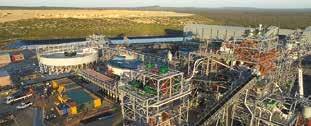
Bitterfontein, a small town on the northern edge of the Western Cape, lies on the Knersvlakte, so called because wagons would grind and crunch their wheels over the quartz stones that litter the area. The translation from Afrikaans is “gnashing plain”.
Bitterfontein is also the railhead for the historic copper mining operations of Okiep in the Northern Cape. In 2023 Bitterfontein was in the news when Nekwana Trading Enterprise announced that it wanted to prospect nearby for garnets, kaolin (clay), leucoxene, monazite, manganese ore and sillimanite.
The Knersvlakte Nature Reserve is part of the Succulent Karoo with leaf succulents prominent. This example of the possible conflict of interest between mining interests and conservation is becoming a staple of West Coast interaction.
South Africa’s second-largest phosphate deposit is being mined by Kropz at its Elandsfontein facility near Saldanha, pictured. The company website notes its environmental responsibilities because the deposit lies below the water table. The nearby Saldanha Lagoon is a “significant wetland in terms of UNESCO’s Ramsar Convention”.
The environmental organisation Protect The West Coast notes that there are currently “more than 30 prospecting and mining applications, as well as scores of active mines on the West Coast”. This includes active prospecting at sea for oil but is mostly related to mineral sands such as zircon, ilmenite, rutile, magnetite and garnet. The organisation is concerned that methods of mining that create trenches on beaches are destructive of the fragile environment.
Tronox’s Namakwa Sands operations is one of the biggest existing mines in the area. Titanium dioxide feedstock suitable for
Council for Geoscience: www.geoscience.org.za
Geological Society of South Africa: www.gssa.org.za
Minerals Council South Africa: www.mineralscouncil.org.za
Kropz is mining the country’s second-largest phosphate deposit.
both the chloride and sulphate TiO2 processes is produced, as is zircon, rutile and pig iron. The operation begins with an openpit mine and concentration plants at Brand-se-Baai, about 385km north of Cape Town. Once separated into ilmenite, natural rutile and zircon, the products are transported to the company’s smelter at Saldanha Bay.
Sixteen rare earth minerals have been identified north of Vanrhynsdorp, with the most prevalent being cerium, an important component of catalytic converters.
Limestone for cement, agricultural lime and feed lime is extracted at several sites in the province’s western regions while kaolin is found in Noordhoek and Somerset West. Ball clay is mined in the Albertina area by G&W Base and Industrial Minerals.
Afrimat has five sand mines, eight quarries, nine readymix batching plants, one dolomite mine and a brick and block factory in the Western Cape. The Cape Bentonite Mine near Heidelberg is run by Ecca Holdings with another site east of Knysna at Roode Fontein. Dimension stone occurs around Vanrhynsdorp and mediumgrain granite is found at Paarl. ■

A holistic approach to acid-mine-drainage management and circular-economy transformation.
“Afirm commitment to sustainable mining extends beyond the th eoretical.” – Dr Ryneth Mbhele.
This article by Water Research Centre group leader Dr Ryneth Mbhele looks at the CSIR’s strategic value chain, market analysis and the significant ways in which the organisation uses its current resources and competencies to transform the mining landscape.
Our emphasis on the AMD value chain exemplifies a complete strategy, encompassing AMD treatment and prediction as well as cleanup and sustainable practices. Recognising the limitations of present approaches, such as high sludge output and variable efficacy, we advocate for long-term improved treatment efficiency, effectively offsetting operating costs and boosting resource recovery. The CSIR’s focus on sustainable AMD practices and bulk supply production demonstrates its dedication to transformational, industry-leading solutions.
At the CSIR, we believe that market analysis must go beyond traditional bounds, investigating the recovery of rare earth elements and minerals from AMD through the lens of circular economy perspectives.The CSIR presents itself as a thought leader at the nexus of environmental responsibility and economic viability.
Our unwavering commitment to sustainable mining goes beyond the theoretical. The CSIR addresses significant environmental challenges by minimising the use of key resources such as water and energy. Our comprehensive approach ensures not only longterm mine closure but also the establishment of new job prospects, paving the path for mechanisation and innovative industry practices.
The CSIR advocates for the generation of food, energy and clean water, aligning its objectives
with broader sustainable development goals.
The organisation’s dedication to innovation is a way of creating a transformational future. This is demonstrated by substantial research and development activities.

Our visionary leadership and groundbreaking initiatives in this research space are set on propelling the mining industry toward a sustainable, circular future. Our strategic value chain, market insights and impactful contributions underscore their pivotal role in driving transformative change across the industry.
Your collaboration with the CSIR isn’t just a strategic choice; it’s an investment in a sustainable, resilient future for the mining sector and our planet. Together, we forge a path towards responsible mining practices and a circular economy that safeguards both the industry and the environment for generations to come. ■
By Dr Ryneth Mbhele Email: rmbhele@csir.co.zaDr Ryneth Mbhele is a research group leader at the CSIR’s Water Research Centre. She holds a PhD in Industrial Chemistry from the University of Pretoria.
The Council for Scientific and Industrial Research (CSIR) is emerging as a trailblazer on the African continent in the continuously changing mining arena, managing the difficult challenges of acidmine drainage (AMD) with its innovative circulareconomy approach.
The difference between the volume of grapes inspected and the volume of grapes exported through the Port of Cape Town in the first weeks of January 2024 reached an all-time high.
While 33.8-million cartons (4.5kg equivalent) were inspected, a total of 17.3-million cartons were exported. These figures were respectively 17% up and 10% down on the previous year’s totals. (South African Table Grape Industry, SATI). The reason for the discrepancy is that ships are not being loaded and unloaded quickly enough. Port authorities, agricultural associations and the provincial government have been working on initiatives to overcome these problems, but they are proving difficult to solve.
Better news for the grape-growing sector in early 2024 came in reports of good weather, good berry sizes and excellent colouring and quality. Farmers are proving innovative in focussing on crop-load management and quality to overcome logistical issues. Some regions are growing more white seedless grapes and producers are paying attention to the quality of grapes, both on-farm and during the coldchain process.
Exports of South African grapes and wine to China are on an upward trend. The imposition in 2020 of prohibitive tariffs on Australian imports by China helped to boost that trend.
Both wine and grape production are supported by the Western Cape Department of Agriculture which offers technology, research and development, agricultural training and analytical services at plant pathology and water and soil laboratories.
There are over 3 500 wine producers in South Africa, with the large majority located in the Western Cape. Wine is produced by estates, independent cellars and producer cellars or co-operatives.
The Distell group runs five distilleries and seven wineries in the Western Cape and produces about a third of the country’s natural and sparkling wine.
South Africa is the eighth-biggest wine producer globally and produces about 4.2% of the world’s wine.
The wine and brandy industry has set about creating a new
Cape Winemakers Guild: www.capewinemakersguild.com
SA Wine Industry Information & Systems: www.sawis.co.za
South African Table Grape Industry: www.satgi.co.za
Vinpro: www.vinpro.co.za

strategic framework in response to the various economic and geopolitical shocks. With wine tourism disappearing during Covid-19 lockdowns and input costs rising, the industry has chosen to strategise for a more sustainable future.
Membership of the Cape Winemakers Guild (CWG) is by invitation and includes some of the best winemakers in the country. Members get together to taste wines from around the world and share their knowledge and ideas.
The Nedbank Cape Winemakers Guild Auction is one of the great events in the wine calendar. In 2022, two of the top four wines were white wines and both were produced by female winemakers –Samantha O’Keefe of Lismore Estate Vineyards and Andrea Mullineux (Mullineux & Leeu). ■
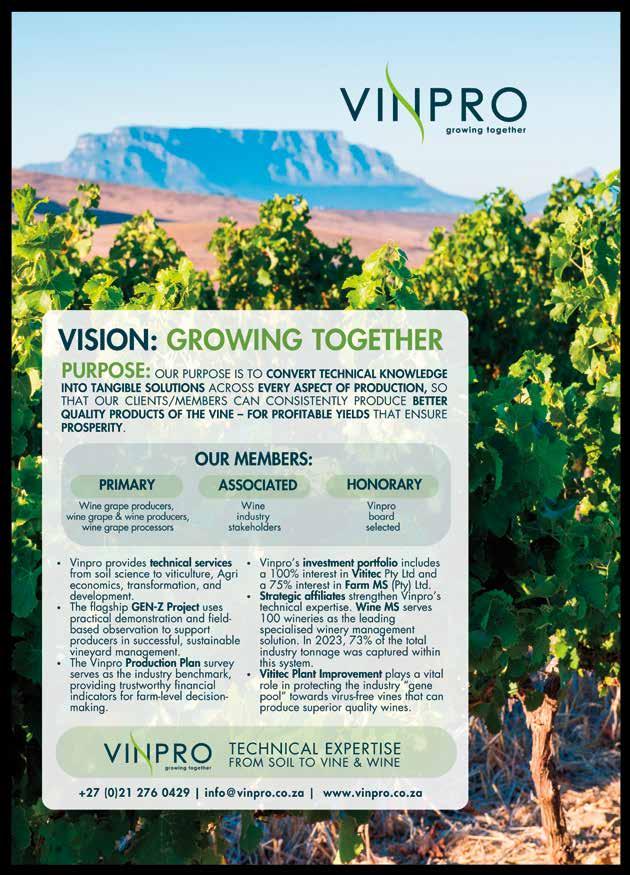
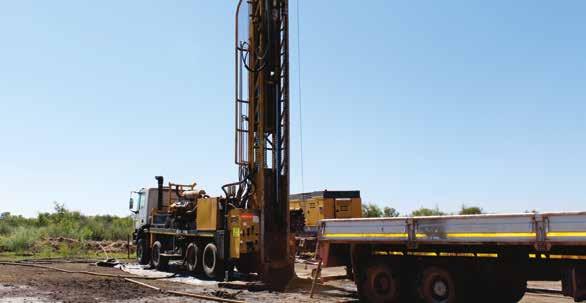
Held in Cape Town in September 2023, the third annual Southern African Oil and Gas Conference was the best-attended event since inception.
Hosted by SAOGA, the Southern African Oil & Gas Alliance, in partnership with the Department of Mineral Resources and Energy (DMRE) and Petroleum Agency South Africa (PASA), the conference heard presentations from Namibia and Guyana about how those countries are making policy around the development of their oil and gas resources. As Sibablwenathi Magida, PASA Executive Manager Communications & Stakeholder Relations says of Guyana’s chosen growth path, “They are doing it sustainably, growing the oil and gas sector and balancing socio-economic development and transformation imperatives.”
The example of Guyana, which has recently discovered vast offshore resources, was both “popular and timeous” for delegates, according to SAOGA CEO Adrian Styrdom. “We were fortunate to have had a look at Guyana as a new oil and gas country and its successful example of combing development, growth and respect for the environment”. Concern about environmental issues has been something that the oil and gas sector has had to deal with, including a number of court cases relating to seismic activity off South Africa’s Wild Coast.
A key issue at stake is the extent and quality of the public participation process when it comes to offshore exploration for gas and oil. WSP Group Africa has been appointed by the consortium which has discovered gas reserves off the coast of Mossel Bay to run the environmental and social impact assessment (ESIA) for their proposed offshore production.
Having notified PASA of their intention to produce, TotalEnergies EP South Africa (TEEPSA), together with its joint venture partners, QatarEnergy, CNR International (South Africa) Limited and a South African consortium,
The Southern African Oil and Gas Conference was the biggest yet.
MainStreet 1549, are obliged to run a public process, having successfully explored the area allocated to them off the southeast coast of South Africa.
The same companies and others are also applying for environmental authorisation to undertake exploration activities in Block 5/6/7 between Cape Town and Cape Agulhas, approximately 60km from the coast at its closest point and 170km at its furthest, in water depths between 700m and 3 200m.
This area holds even greater potential than the southern Cape coast. Shell’s announcement that it had made significant oil and gas discoveries in the southernmost sector of its Orange Basin offshore Namibia is significant because the area is in the same sedimentary basin as South African offshore territory.
PHOTO: PASA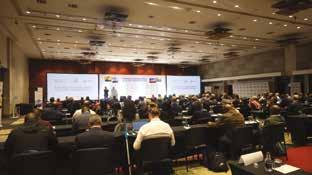
The geological sedimentary basin extends to offshore Cape Town and out to sea, stretching over 160 000km².
Analysis of data shows similar prospectivity in the South African section. The rights to the South African southern section of the basin are held by Shell and its partners TotalEnergies and PetroSA.
Onshore exploration rights are also being granted. The one attracting the most attention is the Virginia Project in the Free State, but PASA’s Manager: Resource Evaluation, David van der Spuy, notes that, “There are other types of unconventional gas onshore, such as coal-bed methane and gas.” He rates the country’s potential for onshore gas as “very good”, including the shale gas deposits of the south-central Karoo where studies show a potential of 209TCF recoverable gas. Basin-analysis studies also show potential for conventional deposits of dry gas and wet gas.
The Saldanha Bay Industrial Development Zone Licensing Company (SBIDZ-LC) has announced the start of phase one of the development of the main infrastructure of the IDZ. Located within the southern hemisphere’s deepest and biggest natural port, the company will spend R3.5-billion on developing 356ha of space to enable the port to offer a wider variety of services. A floating dock, ship-lift facilities and marine service jetties will be among the new services created. Ultimately, the seven-part development plan will see the SBIDZ become a South African Freeport, a Special Economic Zone and customs-controlled area within a port, dedicated to the oil, gas and marine sector.
Astron Energy reopened its Cape Town refinery in stages in the course of 2023, having closed the facility for repairs in 2020 after a fire. The Astron refinery had been producing about 100 000
Petroleum Agency South Africa: www.petroleumagencysa.com
Saldanha Bay Industrial Development Zone: www.sbidz.co.za
South African Oil and Gas Alliance: www.saoga.org.za
Western Cape Maritime Cluster: wcmc.org.za
barrels per day using feedstock from West Africa, a source which will be reinstated.
Cape Town’s oil refinery was previously named Chevron, but with the $973-million purchase of Chevron’s downstream assets in South Africa by Off The Shelf Investments (OTS), it was rebranded as Astron. The Caltex service-station brand was retained. OTS is the Black Economic Empowerment (BEE) partner of mining giant Glencore, who financed the deal. The refinery in Milnerton produces petrol, diesel, jet fuel and liquefied gas for the Western Cape and for export to other African countries.
The Bergun terminal, comprising 12 tanks located on the Eastern Mole of the Port of Cape Town, is connected by pipeline to the Astron refinery.
The Western Cape spends R76-billion annually on crude oil imports and exports refined petroleum to the value of R13.2-billion.
Large quantities of oil are transported around the Cape of Good Hope every year: 32.2% of West Africa’s oil and 23.7% of oil emanating from the Middle East. Problems in the container ship market have caused some stress in the local sector but the long-term prospects for shipping and oil and gas are still strong enough for national government to pursue Operation Phakisa (which includes a strong maritime economy push) and for Transnet National Ports Authority to spend heavily on upgrading the nation’s ports. ■
PHOTO: SAOGA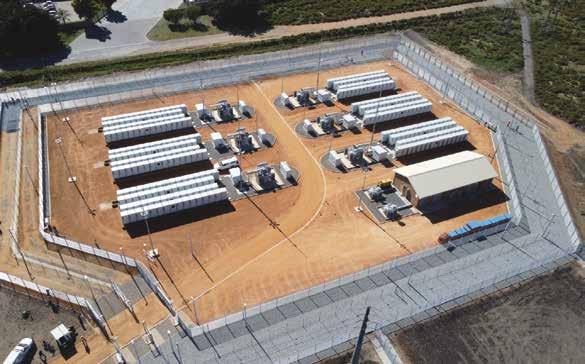
Worcester has a Battery Energy Storage System.
In November 2023 a new era in the Western Cape power sector was launched with the opening of the BESS (Battery Energy Storage Systems) at Worcester. The Eskom project, pictured, is part of the national government’s scheme to add 500MW to the grid via four such projects around the country.
The City of Cape Town also intends deploying BESS. Although BESS only makes up a small part of the national energy plan (Integrated Resource Plan 2019), if combined with renewables, it could prove a useful complement to the city’s other plans. These include a R1.2-billion solar PV (photovoltaic) plant with battery storage at Paardevlei near Somerset West which is intended to produce 60MW. C40 City Finance Facility (CFF) will fund the project while the city will contribute R447-million towards the solar farm, drawn from the R2.3-billion budget allocated to bring loadshedding in the city to an end by 2026.
At the launch of the 2022 Solar Power Africa Conference, Cape Town Mayor Geordin Hill-Lewis unveiled plans for the city to procure 300MW of power from independent power producers. It was estimated in 2021 that loadshedding cost the Western Cape economy R75-million per stage, per day.
Tenders for the city have been opened and at provincial level, 24 municipalities have now been given the legal go-ahead to allow for private generation of solar PV energy. In addition, 19 of those municipalities allow private generators to be compensated for feeding back into the grid, a major breakthrough for the potential take-up by the public.
The City of Cape Town has secured funding for a solar farm.
Provincial Premier Alan Winde has outlined other measures the provincial government is taking to tackle the energy crisis. These include:
• Seven Western Cape municipalities are being supported to develop wheeling frameworks and wheeling tariffs, whereby private-sector entities can sell power over the grid to another business or facility
• Developing standardised legal agreements for wheeling. The City of Cape Town and George Municipality are running wheeling pilots.
• 21 municipalities are able to credit businesses and house -
holds for excess electricity that is fed into the municipal grid from small-scale embedded generation such as rooftop solar panels. • A new solar photovoltaic technician qualification pilot project has been launched at Technical Vocational Education and Training (TVET), including West Coast College and False Bay College.
The early rounds of the Renewable Energy Independent Power Producer Procurement Programme (REIPPPP) continue to produce regular dividends. The Paardekraal East Wind Farm, which is located about 80km north-east of Ceres, is in the Witzenberg Local Municipality. The 110MW project was constructed by the Concor and Conco Consortium, Siemens Gamesa Renewable Energy supplied and installed the wind turbines, the towers were built by GRI in Atlantis and Mainstream Asset Management South Africa will manage the operations.
The support of two of South Africa’s biggest institutional investors, the Industrial Development Corporation (IDC) and the Public Investment Corporation (PIC), has been crucial in getting the renewable energy sector off the ground. They have also helped communities fund their participation in community trusts. Typically, a community trust is established to represent the interests of the local community.
The Western Cape is lobbying for the national Department of Energy to allow Saldanha Bay to be a site for a gas-to-power plant. If a gas plant is built at Saldanha, then it could be a catalyst for the use of gas in many other sectors such as manufacturing and residential.
Recent gas finds by TotalEnergies off the coast of Mossel Bay and off the west coast will accelerate the drive to switch to gas.
The City of Cape Town has signed an agreement with the United States Agency for International Development and the Southern Africa Energy Programme to look for ways to make solar PV more accessible. High costs of installation often preclude residents from taking the solar PV option for their homes.
The Western Cape is positioning itself as a green business hub and is working to find energy alternatives for households and businesses. Greater Cape Town is home to 70% of South
Atlantis Special Economic Zone: www.atlantissez.com
GreenCape: www.greencape.co.za
South African Renewable Energy Technology Centre: www.saretec.org.za
South African Wind Energy Association: www.sawea.org.za
Africa’s manufacturers of renewable components.
GreenCape is an agency that does research and runs projects in areas such as energy efficiency, waste, water and sustainable agriculture. It is a joint initiative of the City of Cape Town, Wesgro and the Provincial Government of the Western Cape.
GreenCape states that nearly R700-million in green technology investments has already been attracted to the Atlantis Special Economic Zone, creating 300 jobs. A further R3.7-billion is anticipated by 2030, which will add more than 3 000 new jobs. Spanish wind tower manufacturer Gestamp Renewable Industries was an early investor in the zone.
A market intelligence report covering energy, renewable energy, water and waste was created by GreenCape to map the assets and challenges in these areas. In addition to trying to attract green investment into the province, the Western Cape is working for improved regulations related to small-scale embedded generation (SSEG).
The Koeberg nuclear power station 30km north of Cape Town is South Africa’s, and Africa’s, only nuclear power station. It was commissioned in 1985. It seems increasingly likely that the country will get more nuclear power stations as provision has been made for such a power source in national energy plans. ■
is a new brand.

ade in Cape Town” was launched in 2021. “Made in the Cape” debuted in 2022. Both branding initiatives aim to create awareness of local talent and to guarantee authenticity of origin.
The “Made in Cape Town” (MiCT) initiative is a joint venture of the Craft and Design Institute (CDI) and the City of Cape Town’s Enterprise and Investment Department. It aims to promote small and local businesses and encourage the idea that “local is lekker”.
Wesgro, the tourism, trade and investment promotion agency for Cape Town and the Western Cape, launched the “Made in the Cape” regionof-origin brand within the broader context of products such as rooibos winning geographical indication (GI) status in the EU after a long battle.
In 2023 the name “Cape Flora” began the long process to win similar accreditation. There is global trend to protect such name brands and Wesgro describes “Made in the Cape” as “strengthening the identity of Cape exports in key international markets”.
The campaign is also helping exporters. The Cape Trade Portal, which started off with 115 registered exporters showcasing 600 products in 2022, grew to 924 exporters showcasing over 4 000 Western Cape products one year later. A buyers’ programme event was held in 2023 where nearly 600 business meetings were held over three days between 31 buyers from 18 countries and 269 Cape exporters.
TFG, which includes Foschini, TotalSports and Markhams among its brands, has been buying up clothing factories for nearly a decade,
Cape Clothing and Textile Cluster: www.capeclothingcluster.org.za
Cape Trade Portal: www.capetradeportal.com
Invest Cape Town: www.investcapetown.com
Made in Cape Town: www.madeincapetown.org.za
Damen Shipyards is delivering its patrol-vessel project.
giving it the ability to respond more quickly to fashion trends.
Among TFG’s acquisitions were Prestige Clothing Maitland and Prestige Clothing Caledon. The group then spent R75million on expanding the factory in Caledon. TFG is ramping up production of clothing and expects to increase staff from just over 3 000 to more than 5 000.
The second of three Multi Mission Inshore Patrol Vessels (MMIPVs) was delivered by Damen Shipyards to the South African Navy in October 2023. The vessel was named the SAS King Shaka Zulu and is part of the programme to protect South Africa’s 2 798km coastline. The multi-vessel project created more than one-million manhours of work during the construction of the three MMIPVs and supported more than 1 000 direct and indirect jobs at Damen Shipyards Cape Town. The yard is maximising local content by using small businesses.
Invest Cape Town reports that the city’s boatbuilding industry is the second-largest producer of recreational catamarans in the world, after France. The city’s companies export 80% of the products that they produce and attract a positive trade balance of approximately $73-million annually. ■
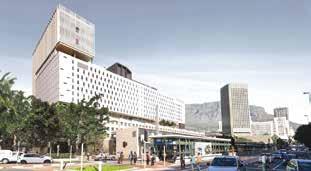
A20-storey mixed-use development has gone up on top of Cape Town Station.
Eris Property Group has leased the station forecourt from the Passenger Rail Agency of South Africa (PRASA) and will house 3 085 students who are eligible for support from the National Student Financial Aid Scheme (NSFAS).
While using the air above state properties such as the station might seem a clever solution, using unused state land for housing seems an obvious solution. There has been very little recourse to what might seem obvious in South Africa, but the Goodwood Station Social Housing Development project has made a start. DCI Community Housing Services has secured the development rights awarded by PRASA for the development of their land around the stations at Heideveld and Goodwood.
DCI provides rental housing accommodation for people who do not qualify for the breaking-new-ground subsidy (previously RDP) and are unable to participate in the formal non-subsidised housing market. The Goodwood project was officially opened in 2023 and DCI has a further railreserve project in the works at Retreat which will bring 164 units to market.
Across the city, more than 6 500 social-housing units are planned or in development on 50 sites identified by the municipality. These include parts of the CBD, along the Voortrekker Road corridor and at Salt River, where a 1 800-unit project will deliver 600 social-housing units. In Woodstock, social housing company Sohco has put the 243-flat project out to tender and occupation should take place in early 2024.
Building Industry Bargaining Council: www.bibc.co.za
Construction Industry Development Board: www.cidb.org.za
SA Institute of Architects: www.saia.org.za
Western Cape Property Developers Forum: www.wcpdf.org.za
Residential building plans reached R15.4-billion in 2022.
The Provincial Government of the Western Cape is in partnership with the University of the Western Cape to deliver more than 2 500 beds for student accommodation. Public comment has been made on a proposed new Inclusionary Housing Framework, which according to the State of the Province Address, “leverages our development planning powers” and aims to increase the number of mixed-use developments in the future.
Residential building plans approved in the Western Cape grew 22% year-on-year in 2022 to reach a value of R14.5-billion. Nine of South Africa’s 10 most expensive suburbs are in Cape Town, according to the Sunday Times, with three of them (Clifton, Bantry Bay and Llandudno) averaging more than R20-million for a house sale.
Semigration from Gauteng is having a big effect on towns such as Plettenberg Bay and Knysna, with a shortage of housing stock causing prices to keep rising as demand grows.
According to the Building Industry Bargaining Council (BIBC), the Western Cape has performed best among the country’s largest construction employment contributors over the last eight quarters, boasting an average growth of some 8%. ■
Cape Town is more connected than ever before.

In June 2023, Cape Town International Airport welcomed a first flight from Eswatini Air. Regular flights will be made between the city and Manzini on Tuesdays, Fridays and Sundays in a 50-seater Embraer ERJ 145.
LAM Mozambique Airlines became the latest addition to the Cape Town direct flight roster when its inaugural flight from Maputo, Mozambique touched down in December 2023. The airline operated the first flight on a Boeing 737-700 but thereafter the route will be serviced by a Bombardier CRJ-900, operating yearround with three flights per week.
Another new airline to start flying to Cape Town is Air Belgium. Belgium is the Western Cape’s seventh-largest European export market, with R2.61-billion in goods exported in 2021, up 81.5% from 2020. Passengers flying to Cape Town on Air Belgium have a stop in Johannesburg where they do not get off the plan. As volumes increase it is expected that Cape Town will get its own direct flight. Two-way passenger traffic showed a 50% recovery for the first six months of 2022, with 8 300 passengers flying between Brussels and Cape Town and for the first six months of 2022, 500 tons of air cargo were flown between the two destinations. South African Airways (SAA) will now fly a direct, non-stop flight Cape Town International Airport with São Paulo-Guarulhos International Airport in São Paulo, Brazil.
George Airport now welcomes over 800 000 passengers each year and also serves as a national distribution hub for cargo such as flowers, fish, oysters, herbs and ferns. George Airport is Africa’s first airport to be solar powered. Plettenberg Bay Aerodrome hosts CemAir which flies to and from Johannesburg and Cape Town. Cargo movement for the whole province was the topic of
Rail usage is down by 95%. SECTOR
the Western Cape Air Cargo Conference held for the first time in 2023. Hosted by Wesgro, Cape Town Air Access and Exporters Western Cape, the event brought together integrators, freight forwarders, local exporters, and domestic, regional and international airlines. Combining talks and networking opportunities with exhibitions from the airlines, the conference was intended to stimulate the province’s air cargo market.
The owners of the Cape Winelands Airport unveiled plans to further develop their property in December 2023. With support from the City of Cape Town, the R7-billion project is expected to open in 2027 if all of the processes such as environmental assessments can be completed and funding secured.
What used to be known as the Fisantekraal Airfield is on the R312 which connects Durbanville with Paarl to the north of the N1 highway. Lockheed Ventura bombers used to fly in and out of the facility when it was a South African Air Force base, originally constructed during World War II. One of the existing airfield’s four runways is earmarked for realignment and extension to a Code 4F runway. It would be capable of accommodating widebody aircraft and new aircraft
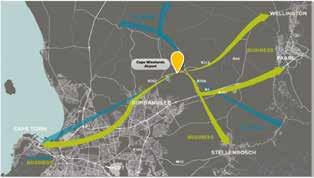
parking stands will be constructed. The airport was renamed the Cape Winelands Airport when new owners bought the property in 2020.
Several reasons have been advanced for the need for an alternative to Cape Town International Airport. The huge volumes being experienced at CTIA are expected to grow, both in terms of cargo and incoming tourists. The Cape Winelands Airport is well situated in terms of delivering tourists to attractive destinations such as the West Coast, Paarl and Stellenbosch.
The airport also has the potential to make the Cape a more attractive destination for long-haul flights. At the moment, aeroplanes flying to Cape Town must carry enough fuel in reserve to be able to fly to an alternate airport if for some reason their intended destination is not able to accept them. This adds to the amount of fuel and therefore the weight of the plane. With the Cape Winelands Airport being only 25km from CTIA, noteworthy savings could be made in terms of weight and fuel consumption.
Additional advantages include the fact that the site’s elevation at 400 feet means that it does not attract winter fog and the fact that the northern suburbs of Cape Town are growing fast.
A new terminal, additional hangars and a cargo-processing facility are planned as part of the core development. In addition, hotel accommodation for passengers and flight students and a heliport are envisaged.
The Cape Winelands Airport development team includes some experienced aviation hands. Board Chairman Dirk Ackerman was CEO of ACSA from 1995 to 2000 and Managing Director Deon Cloete ran CTIA between 2008 and 2021.
Airports Company
South Africa: www.airports.co.za
Passenger Rail Agency of South Africa: www.prasa.com
South African National Roads Agency: www.sanral.co.za
Transport and Urban Development Authority: www.tct.gov.za
The City of Cape Town conducted a feasibility study in the course of 2022 on taking over the management of passenger rail services from PRASA. The city wants to have a fully-integrated system, which would include rail.
In 2022 the city’s Urban Mobility Directorate published an updated Comprehensive Integrated Transport Plan (CITP), outlining the strategies and plans for improving the transport environment in the metropole for five years to 2028.
A range of new factors were considered in drafting the plan, such as the virtual disappearance of passenger rail as an option, the impact of the Covid-19 pandemic and the new trend towards remote working. According to the document, 58% of commuters use private vehicles to get to their destinations; 22% use minibus-taxis; 9% use bus services such as the MyCiTi and GABS; 2% use rail (a decline of 95% for the period 2012 –2022); and about 10% walk. ■
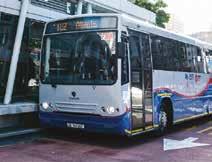 PHOTO: MyCiTi
PHOTO: MyCiTi
Capetonians
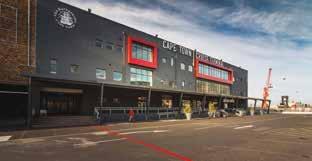
The 317 000 two-way passengers who passed through Cape Town International Airport in December 2023 set a new record, as did the 145 000 cruise-ship passengers who docked at the Port of Cape Town between October 2022 and May 2023.
Both numbers attested to the attractiveness of the Western Cape as a tourism destination, but also to the success of dedicated programmes designed to make travelling to the Cape easier for longhaul destination visitors. The Air Access Cape Town campaign, an initiative to entice airlines to Cape Town, created more than 750 000 new inbound seats between its inception in 2015 and 2020, adding something like R6-billion to the provincial economy. Since then, several airlines have added Cape Town to their rosters, with LAM Mozambique Airlines’ inaugural flight from Maputo, Mozambique, touching down in December 2023. Bombardier CRJ-900s will fly the route three times per week. South African Airways (SAA) announced in June 2023 a direct, non-stop flight connecting Cape Town with São Paulo-Guarulhos International Airport in São Paulo, Brazil.
Annual numbers for the airport also created a new record in 2023, with more than 2.8-million passengers passing the benchmark set in 2019.
The Cruise Cape Town initiative saw a doubling of cruise ship visits in 2022/23, up to 75. Like Air Access, the cruise ship programme is led by Wesgro, the province’s investment promotion agency. On the last weekend of January 2024, three cruise ships were docked at the Cape Town Cruise Terminal, releasing 3 100 passengers and 1 400 crew to spend their foreign currency in the region.
Cape Nature: www.capenature.co.za
Garden Route and Klein Karoo: www.visitgardenrouteandkleinkaroo.com
George Tourism: www.georgetourism.org.za
WESTERN CAPE BUSINESS 2024
Airport and cruise liners set records.
Wesgro estimates that R1.9-billion in foreign direct tourism spend was injected into the Western Cape economy in December 2023.
Southern Sun reported good figures for that month across all segments, including leisure and business travel. The Southern Sun Cullinan, adjacent to the Cape Town International Convention Centre (CTICC), will undergo a full winter refurbishment in 2024. The CTICC enjoyed an excellent year in 2023.
The Western Cape Provincial Government wants to promote education in the arts. Based on research which found that 6% of employment in South Africa is in the cultural sector, the Western Cape will expand the traditional STEM emphasis to include two additional As: Arts and Agriculture.
Grand Parade Investments (GPI), which has sold some of its non-core assets such as Burger King, will delist from the JSE. The company intends to exit the gaming business where it has a minority share in Sun Slots, which operates limited payout machines (LPM). GPI is a shareholder in companies that operate casinos in the Western Cape and, with a 15% stake in SunWest International, GPI is connected to the Table Bay Hotel and the CTICC. ■
The city became an open-air gallery for the eighth edition of a global showcase.
Cape Town is stepping into the limelight as a global art destination. The eighth edition of the International Public Art Festival (IPAF), a transformative celebration of public art and creative collaboration, was held in city in February 2024.
Baz-Art, a pioneering non-profit organisation, proudly presented the festival with the theme “CoACT | C0LLAB”. This year’s edition aimed to redefine Cape Town’s cultural landscape and highlight its emergence as a prominent global art destination.
Local and international artists converged to create large-scale murals, turning the city into an openair gallery of diverse artistic expressions. The theme emphasises creative collaboration, breaking down barriers between different art forms, disciplines and cultures. This collaborative approach aims to redefine public spaces, making them vibrant hubs of cultural connection and community engagement.
A highlight of IPAF 2024 was the blending of art and activism (“artivism”) to raise awareness on critical issues. The Rhino Project, featuring artist Roa from Belgium, unveiled a mural inspired by his time in a rhino conservation project in South Africa. The support from the Delegation of Flanders in South Africa was significant in realising this impactful initiative.
Guided tours, starting at the Company’s Garden, offered an immersive experience, allowing participants to explore the city’s creativity. During the festival days, attendees witnessed the live artistic process of local and international artists. Additionally, Art in the Park Workshops catered to kids and seniors, making art accessible to all ages and fostering community engagement.
About Baz-Art: Baz-Art is a non-profit organisation established in 2016, dedicated to producing art in public spaces and creating opportunities for street artists. Through initiatives like IPAF, Baz-Art aims to grow awareness of the impact of public and urban art, fostering creativity and community engagement. ■
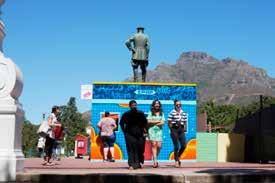
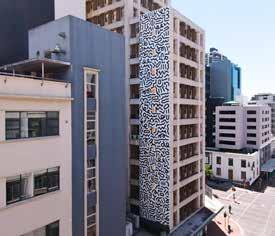


Aconsortium has been launched to study urban health in African cities in the time of climate change.
The Cascading Climate and Health Risks in African Cities (CASCADE) consortium was officially launched in November 2023 with a mission to advance the understanding of critical urban health challenges faced by African cities and to suggest effective interventions. CASCADE is led by two University of Cape Town (UCT) academics, Dr Chris Jack and Professor Bruce Hewitson of the Climate System and Analysis Group (CSAG).
With nearly 60% of Africa’s population expected to be living in cities by 2050, the challenges brought by local and global climate change will make the delivery of clean water and services even tougher than at present. Cape Town has experienced the extremes of drought and regular fires in recent years, with the spectre of “Day Zero” in terms of water availability in 2017 proving a wakeup call that garnered international attention. Partners in the CASCADE project include the University of Ghana, Chinhoyi University of Technology, Makerere University, the Global Change Institute (University of Witwatersrand) and the Nairobi-based African Population and Health Research Center (APHRC).
News from two of the Western Cape’s other tertiary institutions supports the idea that climate-related studies are gaining more attention. Additional funding for postgraduate students in the fields of energy and water-related studies has been made available by the Energy and Water Sector Education and Training Authority (EWSETA). In terms of an agreement with the South African Institute for Advanced Materials Chemistry (SAIAMC) at the University of the Western Cape,
UCT’s Neuroscience Institute has received a R200-million donation.
EWSETA has extended bursary funding to eight students in exciting and diverse areas of study. These include a cellphone application that processes thermal energy storage data to a shearenhanced flotation technology, a primary wastewater treatment technology capable of removing 99.7% of suspended solids from winery wastewater in seconds.
The Chemical Industries Education and Training Authority (CHIETA) has collaborated with the Centre for Entrepreneurship Rapid Incubator (CFERI) at False Bay TVET College to offer a six-month entrepreneurship programme with a focus on the opportunities on offer in the green economy. CFERI is based at the college’s Westlake Campus.
Old-fashioned libraries continue to provide the public with access to the world of books. The Western Cape has the country’s biggest library network with 377 public libraries, all but seven of which have free Internet facilities.
The province’s I-CAN centres allow for public access to digital skills programmes, WiFi and business services. The centres are divided into zones (including Create, Study and Learn) and printing, graphic design and laminating services are available.
The Provincial Government of the Western Cape has invested
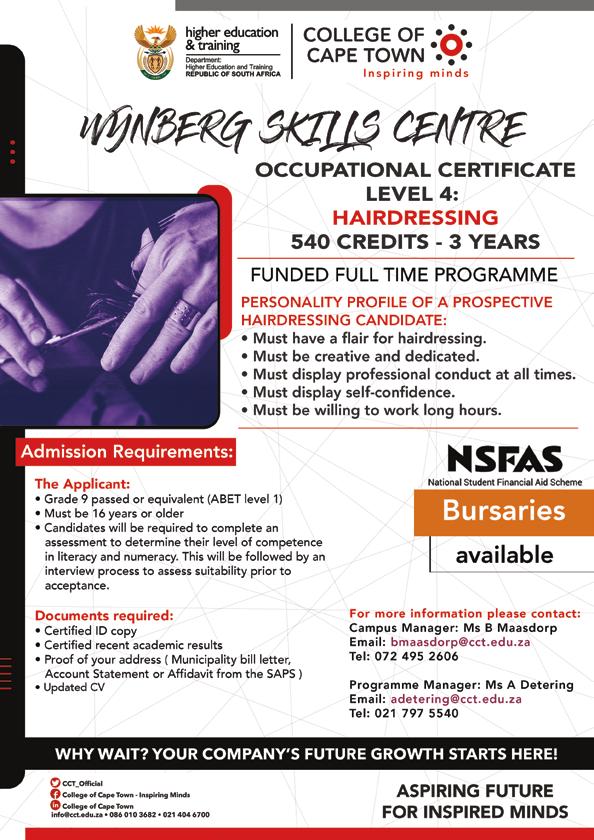
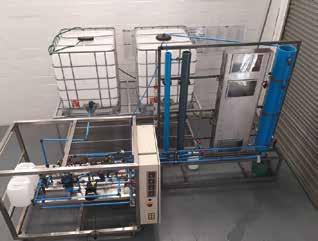
more than R1.6-billion in e-learning over the last five years in response to Covid and the demands of remote learning. A total of 1 290 schools within the province now have broadband connectivity and there are 1 316 with computer labs and 9 992 smart classrooms (SOPA).
The CHIETA SMART Skills Centre has been launched in Saldanha Bay. The Chemical Industries Education and Training Authority intends for the R3-million facility to help citizens learn digital skills. The University of Cape Town joined the trend with the creation of an online high school. The school hopes to close the opportunity gap for poor students in under-resourced areas.
The University of Cape Town has more than 21 500 students, 720 permanent staff and 39 A-rated researchers (40% of South Africa’s total). In 2024, a donation of R200-million from the Donald Gordon Foundation to the university’s Neuroscience Institute was announced.
Stellenbosch University is linked to Stellenbosch’s growing reputation as a technology hub. The University of the Western Cape is home to several national research bodies. These three institutions, plus the Cape Peninsula University of Technology, produce approximately 12 000 science, technology, engineering and mathematics graduates every year and host 11 000 students from other African countries.
University education is available in George through the Nelson Mandela University (NMU): Saasveld is home to the School of Natural Resource Management and the York Street Campus delivers
Apprenticeship Game Changer: www.westerncape.gov.za
Centres of Specialisation: www.dhet.gov.za
SA Renewable Energy Technology Centre: www.saretec.org.za
TVET colleges: www.tvetcolleges.co.za
courses in business and social science, accounting and business management.
Unisa, the country’s biggest distance-learning institution, has a campus in Cape Town and a service centre in George. SARETEC offers industry-specific training in a new economic sector. The South African Renewable Energy Technology Centre is managed by the Cape Peninsula University of Technology (Bellville campus) but it collaborates with several other institutions and private companies.
A Centres of Specialisation Programme has been introduced by the Department of Higher Education and Training to tackle priority skills. The College of Cape Town TVET concentrates on plumbing and automotive motor mechanics. A welding academy in Thornton has been opened with support from the merSETA (Manufacturing, Engineering and Related Services SETA).
Outside of the Cape metropole, Boland College looks after Stellenbosch, Worcester, Paarl and Caledon, while the Southern Cape College covers a wide area, from George to Beaufort West. The West Coast College also has a big catchment area.
Two business schools have taken up new premises in Cape Town. Henley Business School is offering four of its accredited qualifications, three at undergraduate level, and its honours-level Postgraduate Diploma in Management Practice from its Brickfield campus in Woodstock. Students at the Regent Business School in The Boulevard Office Park also have full access to the iLead lab and Black Umbrellas business incubation hub. ■


The Western Cape Business Opportunities Forum (WECBOF) provides a platform for businesses to establish and maintain contact with fellow entrepreneurs; to have access to opportunities, information and training; and to have representation on a number of relevant forums of government and other associations focussed on growing and enhancing the commercial sector, with a specific focus on small-, medium-, and micro enterprises (SMMEs).
WECBOF is widely recognised and respected as a powerful voice for business in the Western Cape; we are a provincial service organisation with our focus and attention firmly on the national and international business pulse. CALL US TODAY.

Access to funding is being prioritised.
Small-business owners chosen to attend a Capital Matching event in 2023 had to put in some sweat equity before they could get in the room with potential funders.
A collaboration between the Western Cape Department of Economic Development and Tourism (DEDAT) and the JSE aims to improve access to capital for SMMEs over a three-year period. The 2023 event was five months in the making, with business owners having to meet certain qualifying criteria before being expected to attend “rigorous capital-readiness workshops”.
More than 80 SMEs were then exposed to funders such as African Bank, ABSA, Nedbank, the National Empowerment Fund (NEF), Small Enterprise Development Agency (SEDA), Esquared, Creative GrowthCap, Business Partners, Sourcefin, EdgeGrowth, AltVest, DEDAT and JSE Private Placements. These funding institutions offered products ranging from debt solutions, equity solutions (angel and venture capital), enterprise supply development (ESD) and grant funding.
Another DEDAT initiative saw 1 000 students selected for training in Business Process Outsourcing, a sector which created about 10 000 new jobs in the year to March 2023. The “Day of 1 000 Opportunities”, pictured, attracted many young people to Athlone Stadium in August 2023 and was an illustration of the provincial government’s “Growth for Jobs” strategy.
Among the initiative’s other partners were CapeBPO, the Jobs Fund through the National Treasury, the College of Cape Town, the BPO Skills Academy, Futur-Ed and the City of Cape Town. Futur-Ed is a support structure consisting of a blended e-learning model for youth who excel at STEM subjects at school.
The Business Hub is a City of Cape Town initiative that gives advice to entrepreneurs. In the first six months of 2022, 973 entrepreneurs participated in skills training offered by the Hub. The Hub partners with Productivity SA and the South African Renewable Energy Incubator in promoting SMMEs. Access to the Hub is free via Smart Cape Services at libraries in the city or where
Cape BPO: www.capebpo.org.za
SA SME Fund: sasmefund.co.za
Small Enterprise Development Agency: www.seda.co.za
Small Enterprise Finance Agency: www.sefa.org.za

free Wi-Fi is provided in all city-run buildings.
Two of the Western Cape’s universities, Stellenbosch and Cape Town, are among the first collaborators with the University Technology Fund (UTF) which aims to commercialise innovations and inventions coming out of tertiary institutions. The UTF has financial clout as it is a part of the South African SME Fund, an offshoot of the CEO Initiative which brought together 50 major corporations, the Public Investment Corporation, the Unemployment Insurance Fund and the Compensation Fund. Among the businesses receiving support from the SA SME Fund is Hyrax, a company which emerged from research done at the University of the Western Cape into which HIVpositive people were resistant to certain drugs. ■
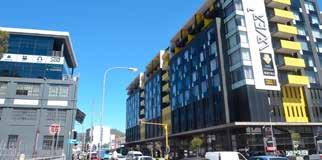
The purchase by Sanlam of Assupol means that the smaller company’s ordinary shares will be delisted from the Cape Town Stock Exchange, pictured, left.
Cape Town-based Sanlam, South Africa’s biggest insurer, paid R6.5-billion for Assupol, which started life as a burial society for the South African police and continues to have a strong presence in the country’s northern provinces although it now offers life insurance and other financial products.
Sanlam, established in 1918 as a life insurer, is now a financial services company with five main divisions, including Corporate, Personal Finance and Emerging Markets. Santam focusses on shortterm insurance. With its headquarters in Bellville, Sanlam is Africa’s largest insurance company.
Sanlam Investments has launched a Sustainable Infrastructure Fund which primarily invests in senior or subordinated debt across a wide range of South African infrastructure assets, with the ability to invest up to 10% in equity.
Another large financial services group, Alexforbes, which has more than R450-billion in assets under management, acquired 100% of OUTvest in 2023. OUTsurance has decided to concentrate on its shortterm insurance business while the addition of OUTvest to Alexforbes’ portfolio gives that group enhanced digital capability.
The Western Cape’s evolution into a technology hub is one of the reasons why one of South Africa’s newest stock exchanges chose to move to the Cape and rebrand as Cape Town Stock Exchange.
This trend is also persuading banks, insurance providers, asset managers and venture capitalists to choose to relocate. There are more than 40 000 jobs in the technology sector (more than double
Financial Sector Conduct Authority: www.fsca.co.za
Insurance Institute of South Africa: www.iisa.co.za
South African Institute of Chartered Accountants: www.saica.co.za
PHOTO: John Young
Assupol will delist from the CTSE.
the total of Nairobi and Lagos combined, Wesgro) and formal employment in the financial sector exceeds 50 000.
Together with business services, the financial sector comprises the biggest contributor to the provincial economy. According to Wesgro, 75% of the venture capital deals that happen in South Africa originate in the Western Cape. Most financial firms based in Cape Town have a long history, some going back as far as 1845 when Old Mutual started. One of the most successful disruptors in recent times has been Stellenbosch-based Capitec Bank.
The head offices of financial firms are dotted all over Cape Town. These include Old Mutual and Foord (Pinelands), Futuregrowth and Coronation (Newlands), Prudential (Claremont), Sygnia (Green Point), Sanlam (Bellville) and Allan Gray (Waterfront). PSG has its headquarters in Stellenbosch and is well represented in rural towns. Insurers such as Santam and Metropolitan Life are based in Bellville. Nomura, a Japanese financial holding company, has a presence in the Cape through Nomura South Africa which offers investment banking services. ■

A campaign is underway to restore Cape Town’s colourful landmarks.
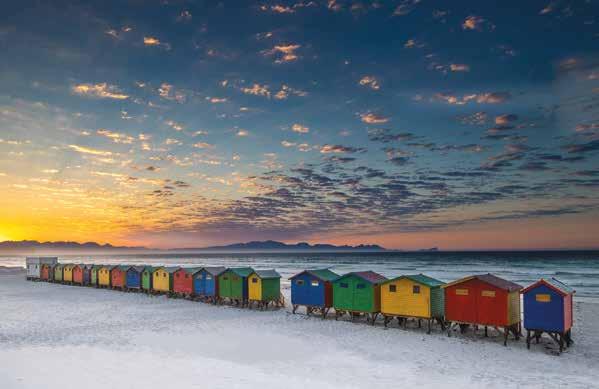
The Beach Huts of Cape Town have been around since the late 1800s. Over their lifetime they have changed significantly, eventually becoming the colourful huts we see today.
They have always been a feature of our beaches. These structures have risen to iconic status, outgrowing their practical usefulness. Their true value lies in being an instantly recognisable image and arguably South Africa’s most iconic man-made structures. They occupy a significant portion of South Africa’s global brand image. The importance of this for attracting tourism to our country cannot be overstated.
Tourism, a large source of foreign direct income, has an important role to play in alleviating poverty and creating opportunities for all South Africans.
Tourism is everybody’s business.
The Beach Huts have been falling into disrepair for some time. A harsh environment, complex
Contact details
Angela Gorman
Mobile: 079 504 1933
Email: info@beachhuts.org.za
municipal structures and more pressing socioeconomic issues have resulted in the nearcollapse of this iconic infrastructure. The Beach Huts are as important to South Africa as the Statue of Liberty or the Eiffel Tower is to New York and Paris.
The SAVE OUR BEACH HUTS campaign, run by The Beach Hut Trust, is a public and private collaborative initiative. The objectives are to Preserve, Protect and Promote the Beach Huts, Cape Town’s most iconic structures. To us, they represent opportunity and hope for South Africa. To the world, they represent a reason to travel here.
We aim to create employment, restore an icon, promote tourism and generate a Beach Beach Huts-inspired industry that will sustain them indefinitely. The opportunities are endless and we are calling on all businesses to see how they can help support the programme to #SaveOurBeachHuts. ■
Daniel Blaauw
Mobile: 081 776 6522
Email: info@beachhuts.org.za
Aim higher and connect more with Telkom Naledi packages.
Elevate your team to new heights with exclusive Telkom Naledi packages that offer great office connectivity solutions and value.
Next-level connectivity. Groundbreaking mobile solutions.

Uncapped data
20GB streaming data
Unlimited Closed-User Group Minutes (Telkom-to-Telkom calls including Telkom landline)
200 Other-Network Minutes
Unlimited SMSs
SIM-only R350
Mobile service with mobile device
Uncapped data
20GB streaming data
Unlimited Closed-User Group Minutes (Telkom-to-Telkom calls including Telkom landline)
600 Other-Network Minutes
Unlimited SMSs
SIM-only R500
Mobile service with mobile device
Streaming data can be used for YouTube, Facebook, Facebook Messenger, Twitter, Instagram, LinkedIn and WhatsApp.
Book an appointment for the full presentation. Email us at RT15enquiries@telkom.co.za